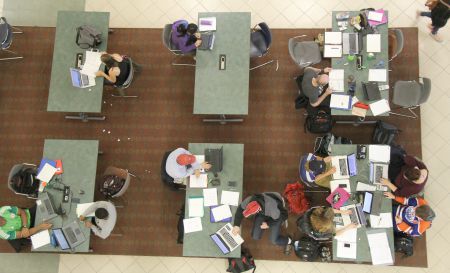
There's more to engineering than hitting the books. Balance in student life is a key to success.
(Edmonton) It's no secret that university can be a stressful time. But often, we miss the signs indicating that people are feeling overwhelmed with the combination of academic and social pressures they're facing.
Because the well-being of students is the university's top priority, The U of A is putting student mental health in the spotlight this week with a major fundraiser and awareness campaign directed at mental health on campus.
In the Faculty of Engineering, new students are advised to take care of themselves. In an address to incoming students this year, Dean of Engineering Fraser Forbes advised students to make the most of their time at university-to focus not only on academics, but also on establishing friendships; and to begin to focus less of getting good grades and more on learning, and to take a break when they need one.
The messages don't stop there. Student Services Manager Raymond Matthias makes sure at the beginning of the school year that students know what they are getting into, and that the U of A offers a high level of services to support students, including the Helping Individuals at Risk web resource.
In one of the first presentations made to first-year engineering students last year, Matthias played audio clips of voice messages students have left, providing new students with advice of developing time management skills, study skills, and to know the resources available to them. This year, more materials were added and shared digitally with qualifying students entering the faculty.
"The one thing I worry about most is that some students don't have a concept of how much stress they may be under, or how much work there is to do," he said.
The Faculty of Engineering has the highest academic entrance requirements of all programs on campus-students who are admitted to the program are accustomed to being at the top of the class. By their own admission, some of them haven't had to study much. But university demands students work hard, and "some students come in with a certain degree of hubris," Matthias says.
"The biggest challenge for some students is putting up their hand and saying "I need help." Some of them haven't had to deal with stress or the fear of failure. For some students the idea of not being at the top of the class is devastating-to the point of being irrational."
Some students need to be told bluntly that resources like the Math and Science Centre-which offers weekly review session, mid-term reviews and exam preparation-is not the same thing as "remedial math" classes offered in high school. It is, rather, a tool to help smart young people who have been admitted into a challenging program.
"It's for people who got 90 or more in math in high school and are now struggling with Math 100-it's not uncommon."
Matthias says it's important that students know the university wants them to succeed. More than 85 per cent of first-year engineering students progress into their second year of studies. Some students decide they're not interested in engineering, other struggle academically. But the faculty wants to see the success rate improve, Matthias adds.